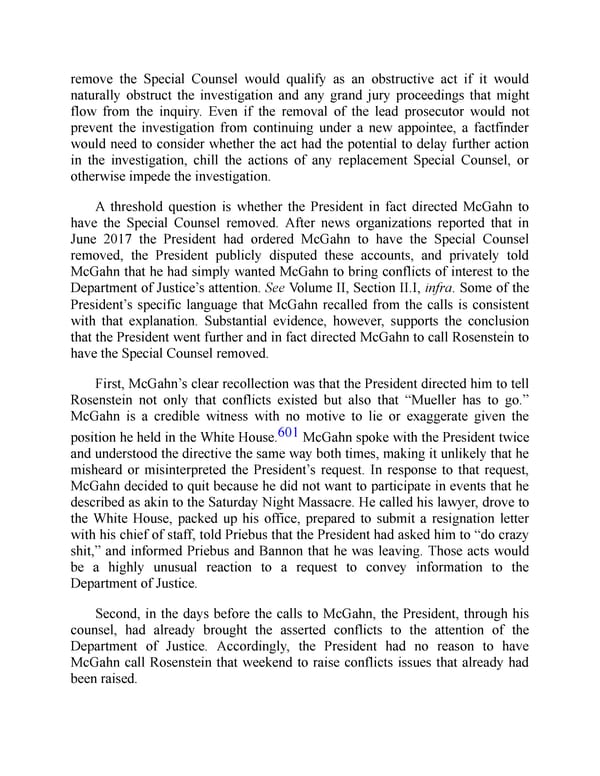remove the Special Counsel would qualify as an obstructive act if it would naturally obstruct the investigation and any grand jury proceedings that might flow from the inquiry. Even if the removal of the lead prosecutor would not prevent the investigation from continuing under a new appointee, a factfinder would need to consider whether the act had the potential to delay further action in the investigation, chill the actions of any replacement Special Counsel, or otherwise impede the investigation. A threshold question is whether the President in fact directed McGahn to have the Special Counsel removed. After news organizations reported that in June 2017 the President had ordered McGahn to have the Special Counsel removed, the President publicly disputed these accounts, and privately told McGahn that he had simply wanted McGahn to bring conflicts of interest to the Department of Justice’s attention. See Volume II, Section II.I, infra. Some of the President’s specific language that McGahn recalled from the calls is consistent with that explanation. Substantial evidence, however, supports the conclusion that the President went further and in fact directed McGahn to call Rosenstein to have the Special Counsel removed. First, McGahn’s clear recollection was that the President directed him to tell Rosenstein not only that conflicts existed but also that “Mueller has to go.” McGahn is a credible witness with no motive to lie or exaggerate given the 601 position he held in the White House. McGahn spoke with the President twice and understood the directive the same way both times, making it unlikely that he misheard or misinterpreted the President’s request. In response to that request, McGahn decided to quit because he did not want to participate in events that he described as akin to the Saturday Night Massacre. He called his lawyer, drove to the White House, packed up his office, prepared to submit a resignation letter with his chief of staff, told Priebus that the President had asked him to “do crazy shit,” and informed Priebus and Bannon that he was leaving. Those acts would be a highly unusual reaction to a request to convey information to the Department of Justice. Second, in the days before the calls to McGahn, the President, through his counsel, had already brought the asserted conflicts to the attention of the Department of Justice. Accordingly, the President had no reason to have McGahn call Rosenstein that weekend to raise conflicts issues that already had been raised.
 Mueller Report PDF Page 353 Page 355
Mueller Report PDF Page 353 Page 355